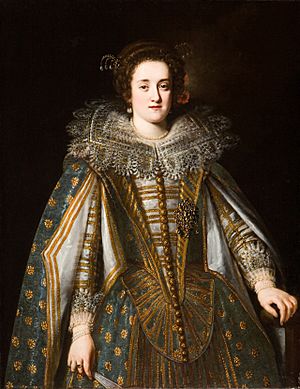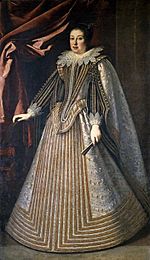Margherita de' Medici facts for kids
Quick facts for kids Margherita de' Medici |
|||||
|---|---|---|---|---|---|

Portrait by Justus Sustermans
|
|||||
| Duchess consort of Parma and Piacenza | |||||
| Tenure | 11 October 1628 – 11 September 1646 |
||||
| Regent of Parma and Piacenza | |||||
| Regency | 1646–1648 | ||||
| Co-Regent | Francesco Maria Farnese | ||||
| Born | 31 May 1612 Palazzo Pitti, Florence, Grand Duchy of Tuscany |
||||
| Died | 6 February 1679 (aged 66) Parma, Duchy of Parma and Piacenza |
||||
| Spouse | Odoardo Farnese, Duke of Parma | ||||
| Issue | Ranuccio II, Duke of Parma Prince Alessandro |
||||
|
|||||
| House | Medici | ||||
| Father | Cosimo II de' Medici | ||||
| Mother | Maria Magdalena of Austria | ||||
| Religion | Roman Catholicism | ||||
Margherita de' Medici (born May 31, 1612 – died February 6, 1679) was a powerful Italian noblewoman. She became the Duchess of Parma and Piacenza when she married Odoardo Farnese, Duke of Parma.
Margherita also served as a regent. This meant she ruled the duchy for a short time. She was regent of Piacenza in 1635. Later, she ruled the entire duchy of Parma from 1646 to 1648. This happened because her son was too young to rule by himself.
Contents
Her Early Life and Marriage
Margherita was born in Florence, Italy. She was the fourth of eight children. Her parents were Cosimo II de' Medici, Grand Duke of Tuscany and Maria Magdalena of Austria. This meant Margherita was related to important European rulers.
When she was just a child, Margherita was promised in marriage to Odoardo Farnese, Duke of Parma. This engagement happened in 1620. They finally married in 1628, when Odoardo became an adult.
Odoardo's father, Ranuccio I Farnese, Duke of Parma, really wanted this marriage to happen. He believed it would make the friendship between the Duchy of Parma and the Grand Duchy of Tuscany stronger. The Medici family ruled Tuscany at that time.
Becoming Duchess of Parma
The wedding took place in Florence on October 11, 1628. The celebrations were very grand and included many shows. An opera called La Flora was even written just for the wedding. When the couple returned to Parma, another show with music by Claudio Monteverdi was performed.
During their time ruling Parma, there was a terrible plague in 1630. The Duke, Odoardo, spent a lot of money on his armies. This meant people had to pay high taxes.
Margherita was known for her beauty and kindness. She was also very well-educated. Unlike some rulers of that time, Duke Odoardo was very loyal to Margherita. There were no stories of him having children with other women.
Her Time as Regent
Duke Odoardo died on September 11, 1646. Their oldest son, Ranuccio, was not old enough to rule the Duchy of Parma by himself. So, his mother, Margherita, became the regent. She ruled the duchy for two years until Ranuccio was old enough.
She shared this ruling duty with her son's uncle, Francesco Maria Farnese. In 1648, her son was declared an adult. This meant Margherita's time as regent came to an end.
Margherita lived a long life and saw at least four of her children pass away before her. She died in Parma on February 6, 1679.
Her Children
Margherita and Odoardo had several children:
- Caterina Farnese (born and died October 2, 1629)
- Ranuccio II Farnese (September 17, 1630 – December 11, 1694): He became the next Duke of Parma. He married three times.
- Alessandro Farnese (January 10, 1635 – February 18, 1689): He was a governor but never married.
- Onorato Farnese (January 24, 1636 – November 2, 1656): He never married.
- Caterina Farnese (September 3, 1637 – April 24, 1684): She became a nun.
- Maria Maddalena Farnese (July 15, 1638 – March 11, 1693): She never married.
- Pietro Farnese (April 4, 1639 – March 4, 1677): He never married.
- Ottavio Farnese (January 5, 1641 – August 4, 1641): He died when he was a baby.
See also
 In Spanish: Margarita de Médici para niños
In Spanish: Margarita de Médici para niños
 | John T. Biggers |
 | Thomas Blackshear |
 | Mark Bradford |
 | Beverly Buchanan |


